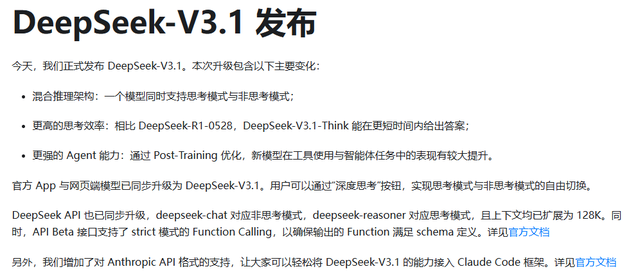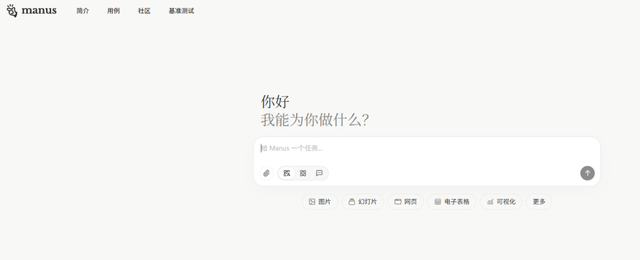Manus Makes an Exit, Tech Titans Falter, DeepSeek Alone Stands Firm
![]() 09/05 2025
09/05 2025
![]() 650
650
Source: Byte Source
A rumor about a "game-changing move" has suddenly emerged.
On September 4, Bloomberg, citing insiders, reported that DeepSeek is covertly developing an AI agent capable of self-evolution. This agent doesn't require complex instructions; it can autonomously learn and execute intricate tasks, with a major release slated for the final quarter of this year.
Company founder Liang Wenfeng is personally heading the team, with OpenAI as their target.
No official response has been issued yet, but this leak isn't without merit.
In DeepSeek's latest August update, the launch of DeepSeek-V3.1, the official upgrade announcement stated: DeepSeek-V3.1 boasts enhanced Agent capabilities, with significant performance improvements in tool utilization and agent tasks through Post-Training optimization.

Screenshot sourced from DeepSeek's official website
Tracing the history of this domain, startups and internet behemoths have frequently flaunted their moves but failed to leave a lasting impression.
Much ado about nothing. The trailblazers only left behind a chaotic aftermath.
DeepSeek's current move can be seen as the "last hope for the village."
01
A Tale of Chaos and Confusion
The AI Agent race in 2025 has witnessed significant upheavals.
The old funding formula of "one concept + top-tier VC + heavy marketing" suddenly lost its effectiveness.
Manus became the first bubble to burst.
In the early hours of March 6, Monica.im unveiled a general-purpose AI agent product, Manus. The launch was as grandiose as the iPhone's debut, with internal testing invitation codes being resold for over ten thousand yuan, and even second-hand platforms seeing scalpers listing them for as high as 100,000 yuan.
A few days after Manus's release, a Chinese team from MetaGPT introduced a new product, claiming to have replicated Manus in just "three hours after dinner" and making it accessible to all.
To be frank, this was merely an assembly line with minimal technical innovation. Utilizing Anthropic's Claude Sonnet model as the core engine, paired with 29 pre-set tools, and coordinated with a framework akin to Code-Act, the so-called "world's first general-purpose AI agent" was born.
Although the execution of so-called intelligent tasks had a high-tech veneer, the final results were riddled with errors. Some users asked it to plan a trip, and it recommended "Antarctic hot pot coupons."
But capital didn't concern itself with these details. In April, a $75 million Series B funding round, led by Benchmark, propelled its valuation to $500 million. The money was spent, and the hype exploded. At its peak, its web traffic soared to 23.76 million, even surpassing established AI tools like Cursor.
A false sense of prosperity.
Manus's downfall seemed predestined. Its business model was completely detached from the Chinese market's realities, with subscription prices ranging from $19 to $199 per month, which was simply laughable. In contrast, ByteDance's overseas version of "Kouzi" started at just $9.

Screenshot sourced from Manus's official website
On April 16, at the Amazon Web Services conference, Manus co-founder Zhang Tao claimed that Claude was the best large model for building agents.
Leveraging the Claude model allowed for rapid concept verification and market entry in the short term but also raised issues like data security and cross-border compliance risks.
Then came the fall from grace. According to foreign media, its user base plummeted from a peak of 20 million to 10 million, with a dismal 5% paid conversion rate, while the cost per task reached $2, eroding market trust.
Ultimately, under U.S. capital's compliance review requirements, Manus quietly cleared its domestic social media accounts, blocked Chinese IPs on its official website, and relocated its headquarters to Singapore, completely abandoning the Chinese market.
A myth inflated by capital had burst.
Even if Manus moved overseas, the ecological environment it faced was likely even more unforgiving. An Indian developer's move directly turned the agent into a laughingstock.
Builder.ai, a British company founded by an Indian entrepreneur, shouted loud slogans: "Building apps is as easy as ordering pizza." But behind the scenes, Indian engineers were "pretending to be AI." Yes, you read that right—"real artificial intelligence," completely manual operations—hand-coding. Eventually, it blew up, causing significant losses for Microsoft and SoftBank.
Globally, the entire field has failed to deliver a satisfactory solution.
02
Tech Giants Can't Be Counted On
If startups can't be trusted, what about resource-rich internet giants?
The answer is far from optimistic.
The scale advantages of these internet giants simply don't translate in this domain, which demands extreme focus and product creativity.
Users have dubbed the agents produced by these giants as "Schrodinger's intelligence" or "artificial stupidity."
These criticisms aren't unfounded. A NANDA research report from MIT pointed out that among over 300 enterprise AI projects surveyed, only 5% truly boosted sales, while the remaining 95%—all failed to meet expected ROI. This proves that even in the B-end market, considered easier to penetrate, the effectiveness of giant agents falls far short of expectations.
Among the giants, strategic confusion and conflicts abound. Microsoft CEO Nadella proclaimed, "The SaaS era is ending; agents will take over everything," while Salesforce's Benioff retorted, "Copilot is just a paperclip assistant 2.0!"
Such verbal sparring among executives is common in the agent field.
Shifting our gaze back to China, although BAT has made frequent moves, they have achieved little success.
Baidu's Xinxiang, as China's first general-purpose super agent app for mobile, was highly touted at its April developer conference. However, just four months into public beta, it was named in an internal Baidu meeting as "clearly requiring reduced investment."

Screenshot sourced from Xinxiang's official website
And so, the once-frequent iterations ceased. On the Apple App Store, its "last updated three weeks ago" notice lingers.
Giants lack an open-source spirit, obsessed with building their own "moats," resulting in severe ecological fragmentation. "Baidu, Alibaba, and ByteDance's agent tool interfaces are all warring independently, driving developers to despair," complained one developer on social media.
The "PPT elite" culture prevalent among giants further stifles AI breakthroughs at the creative level.
Mid-year, "Maopao Ya," a role-playing app under Jieyue Xingchen, led by former ByteDance "Pipixia" head Zhang Xinhao, quietly disbanded. Zhang himself was reassigned as an advisor. This elite, well-versed in giant product methodologies, accustomed to rapid iteration, feature stacking, and data-driven approaches, found all these ineffective in "Maopao Ya." "The PPT-driven, reporting-centric culture within giants has led product managers to migrate mature scenarios like office tools directly into AI ventures, losing the 'handcrafted' artistry—the ability to create products closely aligned with user needs.
In vertical fields like education and healthcare, giant elites excel at PPTs but fail to understand what doctors or teachers truly need.
According to statistics, from 2024 to the present, at least 22 executives from the "Six Little Dragons" have left, with 12 departures in the first half of this year alone. Most of these executives have giant backgrounds, with some already returning to giants.
Small "handcrafted" app teams are now entering the capital spotlight. Liu Xiaopai's AI photo editing tool generated $90,000 in a single month, a figure that embarrasses many entrepreneurial ventures with giant backgrounds. These "handcrafted" teams are small but highly efficient, needing not millions of users but serving a niche well.
"VCs are starting to pay attention to such handcrafted team projects," revealed one investor privately. "But given the current industry climate, they haven't made large-scale investments yet. We need some case studies to verify feasibility." "This, perhaps, is the greatest tragedy for giant elites.
03
A Forced Entry
DeepSeek's personal foray into the agent field carries a hint of resignation.
From past media descriptions of Liang Wenfeng, focus and concentration are his hallmarks. Zhou Hongyi, chairman of 360, stated at the 2025 China Internet Conference that Liang was solely focused on AGI, with no intention of building an app.
But DeepSeek's influence has already been quietly established.
In DeepSeek's V3.1 release documentation, a seemingly innocuous note stated: "UE8M0 FP8 is designed for the upcoming next-gen domestic chip."
"This code string directly ignited the capital market, ushering in a rare super bull run for retail investors.
AI chip company Cambricon's stock price surged 110% that month. "UE8M0 FP8 is a model format specifically customized for the Chinese market, more friendly to Chinese chip vendors," explained Omdia chief analyst Lian Jie, revealing DeepSeek's ability to define hardware standards.
Its influence is global.
DeepSeek R1's early-year release, using an open-source approach, achieved performance on par with or even surpassing OpenAI's top products at a mere few million dollars in R&D cost, shocking the industry. Meta's GenAI department executives earn salaries exceeding $1 million annually.
This move even forced OpenAI, dormant for years, to reintroduce open-source weighted models.
DeepSeek has changed the game.
Now, it's time for applications. Building a complete AI ecosystem requires more than just computing power and large models; ultimate implementation needs applications.
When the market repeatedly proves that no one else can create applications matching their top-tier models, whether "patchwork" efforts like Manus or giant "artificial stupidity" products, all have failed this task.
But the industry needs a showcase—what a true AI agent should look like.
With the atmosphere reaching this fever pitch, the team that once shook the global landscape with R1 must personally bridge the "last mile" from technology to application.
Rumors suggest that alongside this revolutionary agent, the long-awaited next-gen reasoning model truly comparable to GPT-5—DeepSeek R2—is also poised for release.
Advancing on two fronts simultaneously, their ambition is clear.
Some images are sourced from the internet. Please notify us for removal if there are any copyright infringements.







